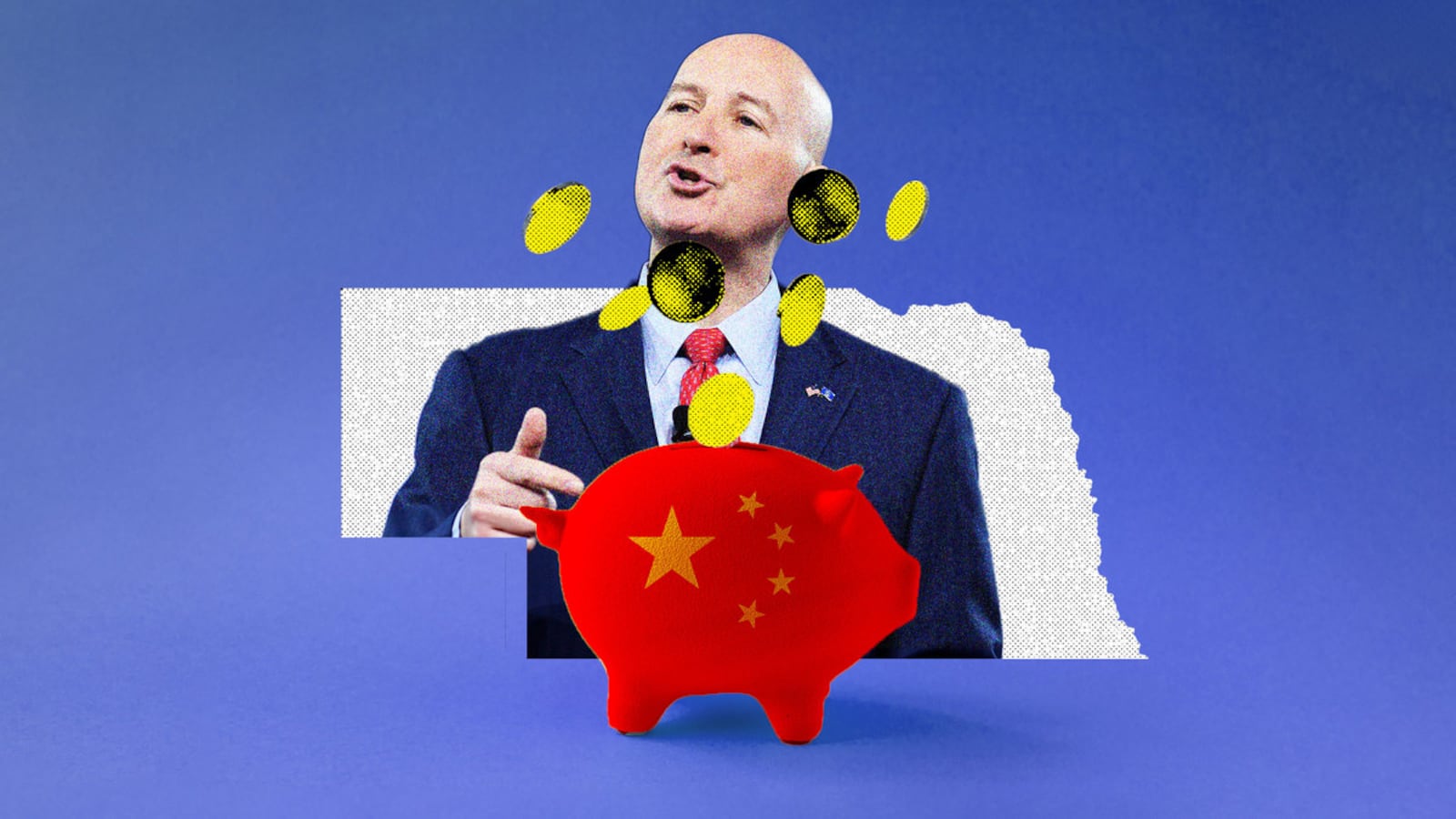A global helium shortage has meant fans of Nebraska’s beloved Cornhuskers can’t release red balloons at home games any more—but the state’s deep-pocketed Gov. Pete Ricketts has floated a new crimson-tinged tradition: Victims of Communism Remembrance Month.
The 31-day memorial for the lives lost to the red peril was launched with Ricketts’ proclamation in July 2021. In a press conference marking the start of solemnities last year, the second-term Republican both contemplated the leftist political movement’s history, and the terror its 20th-century exponents wrought.
“Communism is derived from Karl Marx’s theories, and it’s about class warfare. And it pits people against each other, and ultimately the goal is everything is owned publicly and people are paid according to their needs and wants,” Ricketts said at the announcement. “When you take that theory and put it into practice, it has so many negative consequences.”
The governor took special care to note the then-impending 100th anniversary of the Chinese Communist Party’s founding—which he cited as a kind of inspiration for the Nebraska commemoration.
“I’m sure President Xi Jinping is going to be handing out medals to people who have helped promote communism in his country, and it’s important that we remember the suffering that people have because of the Chinese Communist Party,” said Ricketts, highlighting the ongoing genocide of the nation’s Uighur Muslim minority. “So we want to balance out what the Chinese Communist Party is going to be saying and remember the people who are suffering under that regime.”

Nebraska Gov. Pete Ricketts speaks to CPAC in 2017.
Mike Theiler/GettyThis year Ricketts, who co-owns the Chicago Cubs with his billionaire daddy Joe Ricketts and other family members, closed out the July tribute with a fire-breathing editorial again aimed at Beijing.
“In recent years, the [Chinese Communist Party] has ruthlessly crushed dissent in Hong Kong. It has committed genocide against ethnic Uighurs. And it is one of the world’s worst abusers of religious freedom,” the governor wrote in a note on his state webpage. “This proclamation also serves to remind Nebraskans of the CCP’s corrosive reach abroad.”
But while the governor has seethed at Chinese theft of U.S. tech and agricultural secrets, and deplored those who “have viewed China’s growing economy as a major trade opportunity,” a review of his financial disclosures suggests capitalist self-interest—not his anti-Communist politics—guides his financial strategy.
Official filings through February of this year reveal Ricketts as a partner in the funds and affiliates of a firm called Schulze Global Investments, a company the documents show to be based in Beijing. The governor has held these investments for years, even as his anti-communist invective has intensified—and even though, according to a 2018 Omaha World-Herald report, he had not placed his assets in a blind trust but continued managing them directly while reigning in Lincoln.
Outreach by The Daily Beast was met with crickets from Ricketts and his team, and it is unclear whether he still personally oversees his entire business portfolio. But his financial disclosures do not show any trust in his name charged with handling his financial affairs. The documents he submitted to the state characterize him as a “limited partner” in the Schulze entities, which indicates he does not govern their day-to-day operations.
Since Ricketts’ first term, the World-Herald has associated two of the Schulze vehicles in which he holds stakes—Schulze Global Ethiopia Growth and SGI Africa Cement Partners—with a cement manufacturing facility in the Ethiopian city of Dire Dawa, in the northern corner of the East African nation. The governor seemed to acknowledge this in an interview with the paper in 2015.
“Not only do the investors make money,” he told the outlet. “But we also help develop the infrastructure of developing nations.”

Nebraska Gov. Pete Ricketts speaks to President Donald Trump during a meeting on trade on April 12, 2018, in Washington, D.C.
GettyAccording to its website, the original founders of the cement complex were Italian fascists who occupied the country in the run-up to World War II. Few but the closest observers noticed last year when the plant fell into the hands of a far larger empire than any Benito Mussolini ever commanded.
According to Hong Kong stock exchange records and market reports, in July 2021, the Ricketts-linked Schulze entities took part in a massive deal that handed 61.9 percent of the factory’s shares to West China Cement. A subsequent report West China Cement published indicated that through this deal it had acquired the Ricketts-tied funds’ entire stake in the mill—at a price of $23,380,000.
Ricketts’ most recent disclosure, dated March 1, 2022, continued to list the Schulze companies among his assets. It is unclear from these documents whether he has any continued interest in the Ethiopian operation, or what windfall he might have realized from the sale. The financial filings do not break down the specific holdings in every firm the governor has invested in, nor does it provide a valuation of his share in the firms, making it impossible to see whether or how they have changed year over year.
According to its own corporate history, West China Cement grew out of a pair of cement-manufacturing facilities local government authorities established in the People’s Republic of China in the 1970s. The company has undergone multiple reorganizations in the decades since, but according to the Japanese financial publication Nikkei Asia, more than 29 percent of the firm’s shares belong to Anhui Conch Cement, itself controlled by the Anhui provincial government.
Moreover, West China Cement has an explicit mission of advancing Chinese economic development and policy goals, including through supporting construction in Xinjiang—the site of the Uighur internment over which the Nebraska governor shed tears and ink.
Such pledges of allegiance from Chinese companies to the national interest are so common they’ve become cliché, according to Dr. Shirley Ze Yu, director of the China-Africa initiative at the London School of Economics. But the professor added that cement is literally foundational for Beijing’s interests at home and in Africa.
First, Yu noted, China faces a slowdown in the real estate market that has long powered its economy and sustained a massive domestic appetite for construction goods. To keep its heavy industries running strong, China must pour resources into developing nations.
Second, just like the 20th-century Italian invaders, China needs hard physical assets to solidify its political and economic dominance over other countries.
“Chinese companies cannot build infrastructure if cement is in shortage,” Yu wrote in an email to The Daily Beast. “Resources cannot be shipped to the coast if roads and ports are not built.”
Yu pointed out that the Ethiopian acquisition was part of an African spending spree West China Cement carried out in 2021, as the firm inked deals in Mozambique and the Democratic Republic of the Congo, part of an unguarded strategy of enlarging its footprint on the continent.
But Paul Nantulya, a research associate at the Africa Center for Strategic Studies at the National Defense University, told The Daily Beast that Beijing’s relationship with Ethiopia differs from any other it has in Africa—or anywhere on the planet. While in other emerging markets China has sought mainly to extract and devour raw materials, it has built up Ethiopia as a model political and economic partner to present to the whole world.
No other nation has so closely emulated China’s model of authoritarian governance and state-guided investment, and Ethiopian police, military, federal, and municipal officials meet frequently with their Chinese counterparts. Chinese financial and logistical support has thus turned Ethiopia into a flagship project of its sprawling Belt-and-Road Initiative, Nantulya said, referring to the globe-spanning program of loans and technical assistance through which Beijing hopes to supplant the United States as the world’s pre-eminent power.
The East African nation’s bloody 10-month civil war has done nothing to sever its bonds with China. And, as Nantulya noted, “cement and the Belt-and-Road essentially go together.”
“Anybody who has visited Ethiopia in the last 10 years can tell you that you can basically describe Ethiopia as a large construction site,” he told The Daily Beast. “There have been massive, massive investments in construction, most of which are delivered through Chinese-Ethiopian partnerships, financed by Chinese banks, and built by Chinese firms.”
The presence of U.S. investors like Ricketts and Schulze is hardly unusual: in fact, it perfectly suits China’s designs, Nantulya said. The country has long courted the American capitalist class, eager to exploit its funds and know-how.
“Basically the Chinese government refers to these as ‘hybrid projects,’ which are essentially Chinese-driven but depend heavily on Western expertise and Western involvement,” Nantulya argued. “There is also a political and propaganda value. The Chinese can say, ‘Hang on a minute, this is not entirely Chinese, there are American individuals, American firms involved here, on the ground.’ It provides China with propaganda talking points, both to the Chinese population, but also across the Global South, which enhances the legitimacy of the Belt and Road process.”
Authoritarian associations are business as usual with Schulze Global Investments and its eponymous founder, Gabriel Schulze—who, like Ricketts, was born into astounding privilege.
Heir to a colossal mining fortune, Schulze set up shop in China nearly two decades ago, but quickly pivoted to what he saw as “frontier” markets in less developed lands. Among these has been another totalitarian communist regime: North Korea, which the investor visited in 2011.
Indeed, so partial is Schulze to Pyongyang, that in 2018 The New York Times reported he had made overtures on the country’s behalf to Jared Kushner, senior adviser and son-in-law to then-President Donald Trump.
The Daily Beast reached out repeatedly to Cerberus Capital Management, which absorbed SGI in 2018 and made the now-Singapore-based Schulze its senior managing director, but received no reply.





